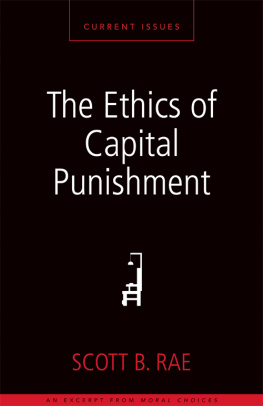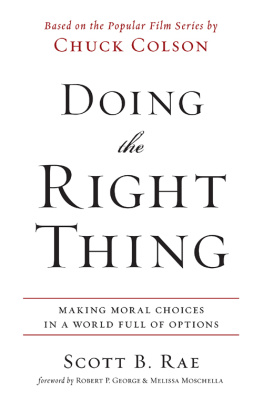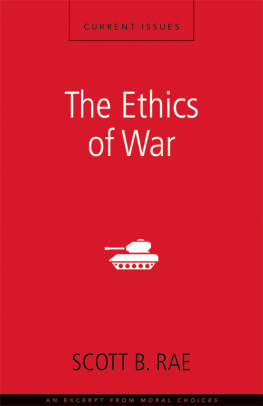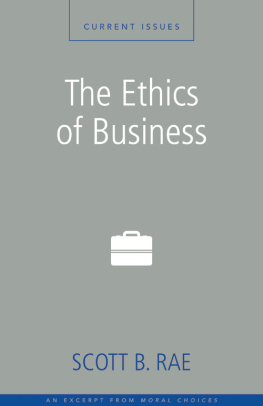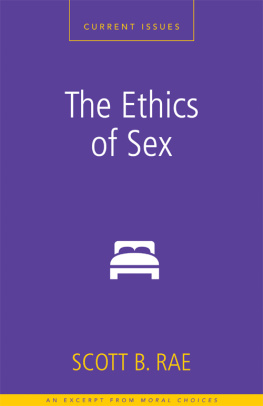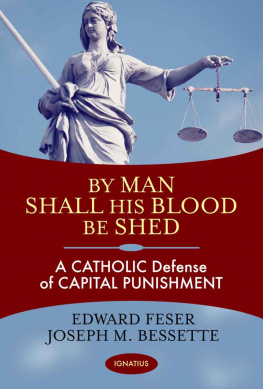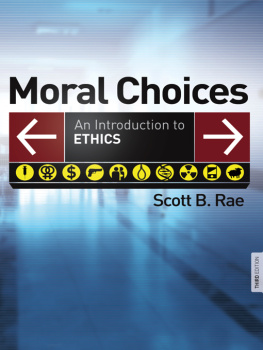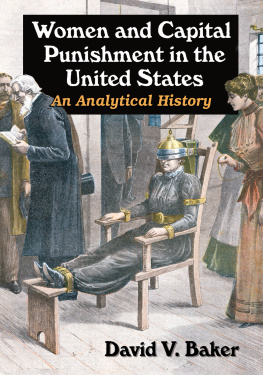ZONDERVAN
The Ethics of Capital Punishment
Previously published in Moral Choices
Copyright 1995, 2000, 2009 by Scott B. Rae
All rights reserved under International and Pan-American Copyright Conventions. By payment of the required fees, you have been granted the non-exclusive, non-transferable right to access and read the text of this e-book on-screen. No part of this text may be reproduced, transmitted, downloaded, decompiled, reverse engineered, or stored in or introduced into any information storage and retrieval system, in any form or by any means, whether electronic or mechanical, now known or hereinafter invented, without the express written permission of Zondervan.
EPub Edition JANUARY 2012 ISBN: 978-0-310-49647-2
Requests for information should be addressed to:
Zondervan, Grand Rapids, Michigan 49530
The Library of Congress has cataloged the original edition as follows:
Rae, Scott B.
Moral choices: an introduction to ethics / Scott B. Rae3rd ed.
p. cm.
ISBN 978-0-310-29109-1 (hardcover)
1. Ethics. I. Title.
BJ1012.R32 2009
170dc22 2009005151
All Scripture quotations, unless otherwise indicated, are taken from the Holy Bible, New International Version. NIV. Copyright 1973, 1978, 1984 by International Bible Society. Used by permission of Zondervan. All rights reserved.
All Scripture quotations marked TNIV are taken from the Holy Bible, Todays New International Version. Copyright 2001 by International Bible permission of Zondervan. All rights reserved.
Scripture quotations marked KJV are taken from the King James Version of the Bible.
Scripture quotations marked NASB are taken from the New American Standard Bible. Copyright 1960, 1962, 1963, 1968, 1971, 1972, 1973, 1975, 1977, 1995 by The Lockman Foundation. Used by permission.
Any Internet addresses (websites, blogs, etc.) and telephone numbers in this book are offered as a resource. They are not intended in any way to be or imply an endorsement by Zondervan, nor does Zondervan vouch for the content of these sites and numbers for the life of this book.
All rights reserved. No part of this publication may be reproduced, stored in a retrieval system, or transmitted in any form or by any meanselectronic, mechanical, photocopy, recording, or any otherexcept for brief quotations in printed reviews, without the prior permission of the publisher.
Cover design: Ron Huizinga
Interior design: Matthew Van Zomeran
Whenever there is an execution in the approximately thirty-five U.S. states that have the death penalty, one can usually find both advocates and opponents of capital punishment gathered outside the prison to make statements about the morality of the death penalty. The advocates claim that the condemned murderer is getting what he deserves, that the demands of justice are about to be satisfied. Opponents protest that capital punishment is a barbaric practice, out of place in the modern world and unconstitutional as cruel and inhuman punishment.
Interestingly, religious believers from a variety of religious traditions can be found on both sides of the issue, and usually religious groups hold up signs and placards with biblical references on them. The advocates of the death penalty cite Old Testament passages that speak of the principle of life for life and insist that condemned murderers should justly receive death as a consequence of their actions. On the other hand, opponents of capital punishment quote teachings of Jesus with emphasis on mercy, the fact that vengeance belongs to God, and the sacredness of human life. These opposing opinions illustrate that the Christian community mirrors the same debate about the death penalty that exists in society as a whole.
Imagine a situation in which you are a member of a jury that is hearing a murder case. The jury has already convicted the person of first-degree murder. You now proceed to the sentencing phase of the trial. Here you must decide if the crime committed warrants the death penalty. In most states, carefully defined conditions, such as the heinousness of the crime or multiple murders are necessary for a death sentence. You were likely questioned by the attorneys about your view of the death penalty prior to being selected for the jury. Neither the prosecution nor the defense had reservations about your view. But now that it is actually time to make a decision that may result in the death of another person, you are seriously reconsidering your view.
The United States is one of the few industrialized countries that still retains capital punishment. Most countries in Europe have prohibited it, while it remains in force in some Asian countries. Many third world countries and Islamic republics apply the death penalty for a variety of crimes, not just for murder. For example, drug trafficking warrants the death penalty in countries such as Singapore and Malaysia.
The United States Supreme Court has issued two significant decisions concerning capital punishment. The first was the case of Furman v. Georgia (1972), in which the Court ruled that capital punishment as currently administered in the state of Georgia violated the Eighth Amendment against cruel and inhuman punishment. In Gregg v. Georgia (1976), the Court upheld a death sentence for murder but made sure that juries had careful guidelines to follow in determining the appropriateness of the death sentence. After these two cases, thirty-five states enacted new laws authorizing the death penalty for certain crimes. In 1974, in the wake of growing international terrorism, Congress legislated the death penalty for murder in airline hijacking cases.
Those who oppose the death penalty are known as abolitionists, since they favor abolishing death sentences. Although they may disagree about the particulars of some of their arguments, all abolitionists agree that the death penalty is never morally justifiable. Those who favor capital punishment are called retentionists because they favor retaining the death penalty. Not all retentionists, however, agree on the particular circumstances that justify capital punishment or on the specific arguments for their position. Inherent in the retentionist view is the sense that capital punishment has been allowed historically and that moral reservations about its use have arisen only within the last century. Thus capital punishment has been traditionally viewed as morally legitimate and necessary in many cultures. Only in recent modern times have objections been raised to what abolitionists call a cruel and outdated form of criminal justice.
A third view has arisen in recent years that occupies somewhat of a middle ground between the two predominant views. I will call this the procedural abolitionist. The person who holds this view argues that there is nothing wrong with the death penalty in principle. But since there are a variety of procedural problems with the administration of the death penalty, one should be very careful about having the death penalty at all. The advocate of this view might put a moratorium on capital punishment or even abolish it entirely for these reasons. But one who holds this view might also agree that in rare cases the death penalty could be justified. For all practical purposes, this person fits in the abolitionist camp, but for procedural, not principled reasons.
While most people agree on the general morality of punishment for crime, they disagree on the primary goal of criminal punishment, whether it should be retribution, deterrence, or rehabilitation. Criminal sanctions intend to evoke a respect for the law that is necessary if society is to keep from plunging into chaos. From the biblical perspective, given the reality of humankinds nature, called total depravity by theologians, some kind of deterrent is necessary for people to obey the law. Further, respect for those who do abide by the law demands a penalty for those who do not.

